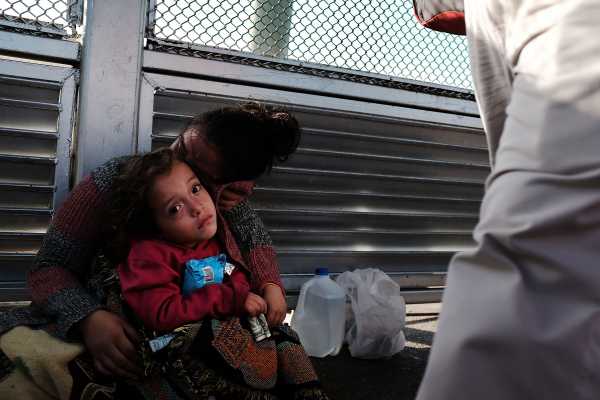
The Department of Justice, under Attorney General Jeff Sessions, is drafting a plan that would totally overhaul asylum policy in the United States.
Under the plan, people would be barred from getting asylum if they came into the US between ports of entry and were prosecuted for illegal entry. It would also add presumptions that would make it extremely difficult for Central Americans to qualify for asylum, and codify — in an even more restrictive form — an opinion written by Sessions in June that attempted to restrict asylum for victims of domestic and gang violence.
Vox has confirmed that the regulation is in the process of being evaluated, and has seen a copy of a draft of the regulation.
When the regulation is ready, it will be published in the Federal Register as a notice of proposed rulemaking, with 90 days for the public to comment before it’s enacted as a final regulation.
The version Vox saw may change before it’s finalized, or even before the proposal is published in the Federal Register. (The Department of Justice declined to comment.)
But as it exists now, the proposal is a sweeping and thorough revamp of asylum — tightening the screws throughout the asylum process.
One source familiar with the asylum process but not authorized to speak on the record described the proposed changes as “the most severe restrictions on asylum since at least 1965” — when the law that created the current legal immigration system was passed — and “possibly even further back.”
The Immigration and Nationality Act gives the attorney general, along with the Department of Homeland Security, discretion over asylum standards — saying that the government “may grant asylum” to an applicant who they determine meets the definition of a refugee. But the proposed regulation would make it nearly impossible for Central Americans, including families, to earn the government’s approval.
It would eliminate the path that thousands of Central Americans, including families, take every month to seek asylum in the US: entering between ports of entry and presenting themselves to Border Patrol agents. It would make it all but impossible for victims of domestic or gang violence to qualify for asylum — going even further than a June decision from Sessions that sought to limit asylum access for those groups. It would create a presumption against Central Americans who travel through Mexico on their way to the US.
Anyone convicted of entering the US illegally would become ineligible for asylum
What happens under current policy: Under the Trump administration’s “zero tolerance” initiative, all migrants who cross between ports of entry and are apprehended by Border Patrol are supposed to be criminally prosecuted for illegal entry.
That arrest can delay a person’s claim of asylum, but it doesn’t derail it. An asylum-seeker may not get their initial screening interview, which determines whether they’ll be allowed to file an asylum application and get a hearing, until after they’ve been prosecuted and convicted. And they definitely won’t get approved for asylum before their criminal conviction.
But the conviction for illegal entry doesn’t affect the asylum claim; as Customs and Border Protection puts it, the two are on “parallel tracks.”
What would happen under the new plan: The proposed regulation would bar anyone from getting asylum if they’d been convicted of illegal entry or illegal reentry. That means people who asked for asylum when they were apprehended at the border, but were prosecuted first, would get denied asylum.
In effect, under this new regulation, combined with the zero-tolerance prosecution initiative, no one would be able to come to the US and get asylum unless they presented themselves at a port of entry. Many asylum-seekers simply don’t have that option. Smugglers often prevent asylum-seekers from using official ports of entry, and many of those who do come to ports of entry are being forced to wait days or weeks, after being told there’s no room to process them right now. And asylum-seekers who come to ports of entry are often required to stay in immigration detention without bond until their case is complete.
The administration would almost certainly get sued over this provision if it ended up included in the finalized regulation. The Department of Justice (DOJ) has the power to bar people from getting asylum (or other forms of relief from deportation) if they’ve committed “particularly serious crimes.” While there’s no definition of seriousness in the law, lawyers and immigration advocates would likely challenge the idea that illegal entry, a misdemeanor, is “particularly serious.”
But even if that provision is struck down or eliminated by the courts, another proposal in the draft regulation could have much the same effect. It would instruct immigration judges to consider how the asylum-seeker got into the US, and treat it as a significant factor in whether or not to grant asylum (since asylum-seekers have to show they deserve “favorable discretion” from the judge). So even if people who crossed between ports of entry weren’t officially banned from getting asylum, they would have a very hard time winning their cases in practice.
If adopted, the regulation, combined with the zero tolerance initiative, would allow the administration to set up assembly-line justice for asylum seekers, including families, entering the US. People who entered between official ports would be held by the Department of Homeland Security, prosecuted for illegal entry, convicted, then have their asylum applications denied and get deported.
While the Trump administration is currently trying to win the power to detain families for more than 20 days, if this regulation were enacted, they might not even need to. They could deny most asylum claims and deport the claimants within that time.
Victims of domestic or gang violence would be all but banned from asylum
What happens under current policy: US law limits asylum to people who are persecuted because of their race, religion, political opinions, nationality, or membership in a particular social group.
The government has been wrestling for decades with that last classification — what exactly counts as a “particular social group”? — and with whether someone is “persecuted” if they’re victimized by someone other than the government. These questions are key to the fate of many of the Central Americans (including children and families) who have come to the US to seek asylum in recent years, many of whom are claiming asylum based on domestic violence or gang victimization in their home countries.
In June, with a sweeping ruling overturning a case from the Board of Immigration Appeals, Sessions attempted to narrow the circumstances in which someone fleeing domestic or gang violence could qualify for asylum in the US — saying that, generally, victims of domestic or gang violence wouldn’t be eligible for asylum based on their victimization.
As I reported last week, though, US Citizenship and Immigration Services (USCIS) has been cautious in implementing Sessions’s opinion. Most notably, while Sessions decreed that his ruling overturned any precedent that contradicted it, USCIS only told asylum officers to stop using the one precedent decision Sessions explicitly named as moot.
It looks like the DOJ may be trying to use regulation to accomplish the same goal — with even narrower definitions of “persecuted” and “particular social group.”
What would happen under the plan: The proposed regulation would add several restrictions to what could constitute a particular social group: a family, for example, wouldn’t be a social group unless the family had a visible national presence. Interpersonal violence or crime victimization, similarly, wouldn’t be the basis for social group membership unless they were happening on a national scale. Having been recruited by a gang would be explicitly prohibited as grounds for an asylum claim.
To qualify for asylum, an applicant would have to show that the people who persecuted her were also persecuting others on the same basis. Human-rights lawyers worry this could disqualify many legitimate asylum claims. One lawyer raises the example of a gay man in Russia who suffers a violent homophobic attack: Under the proposal, “this would not be persecution on account of sexual orientation unless you could prove that these attackers had previously persecuted other gay men.”
An asylum-seeker would be required to provide an exact definition of her “particular social group” when she was applying for asylum. And she wouldn’t be allowed to appeal a denial, or reopen a claim, on the basis of any group she hadn’t originally named.
It’s extremely difficult for anyone other than a trained immigration lawyer to know exactly what does and doesn’t count as a particular social group eligible for asylum. Under the proposed regulation, however, an asylum-seeker who didn’t know the precise nature of the basis for her persecution would be assumed to not really be a victim of persecution at all.
This standard wouldn’t just apply to final approvals or denials of asylum. The initial step for an asylee is what’s called a “credible fear” screening, during which an asylum officer decides whether the person has a credible fear of going back to their home country. The proposed rule would tighten standards for those, too.
Immigration lawyers and border advocates were already extremely concerned that Sessions’s May ruling would cause asylum officers to radically hike the standards for passing the screening interview (though the USCIS memo posted by Vox suggests that might not be the case just yet). If this regulation were finalized, however, it seems very possible that many people who are currently given the opportunity to apply for asylum would be turned away before they got the chance.
Central Americans would be penalized for not seeking asylum in Mexico
What happens under current policy: Many asylum seekers are Central Americans who come through Mexico to seek asylum in the US. The US is not allowed to simply turn them back and force them to seek asylum in Mexico instead. (The Trump administration is trying to get Mexico to sign a “safe third country” agreement that would allow them to do this, but Mexico appears unenthusiastic.) But the proposed regulation would make it a lot easier to deny their asylum claims based on not having sought asylum in Mexico first.
What would happen under the plan: Under the proposed rule, the government would generally withhold “favorable discretion” (and, therefore, deny the asylum claim) for anyone who had spent more than two weeks in another country en route to the US without seeking asylum there, or who had traveled through more than one country on the way to the US.
Many Central Americans, especially if they take the train through Mexico or travel on foot, take more than two weeks to travel through Mexico. And asylum-seekers from Honduras and El Salvador cross through Guatemala and Mexico to get to the US — meaning that they would almost certainly not earn the “favorable discretion” required to get their asylum claim approved.
Tightening the screws on the entire asylum process
The proposed regulation is extremely broad, with a lot more provisions — all of which would make it much harder for people to seek and get asylum. Some of the remaining ideas in the proposed draft include:
Limiting appeals for asylum-seekers who fail their screening interviews. Under current law, if an asylum-seeker fails her initial “credible fear” interview with an asylum officer, she can appeal for a judge to review her claim with fresh eyes — ignoring the fact that the asylum officer hadn’t found it a credible claim. Under the proposed regulation, judges would only be able to approve a credible-fear claim on appeal if there was clear evidence that the asylum officer had screwed up.
Rejecting incomplete applications first and letting them get completed later. Instead of returning incomplete asylum applications to the applicant and asking her to complete it, the government would reject the application. The applicant would still have 60 days to complete and resubmit the application before it was officially denied, but it’s not clear how applicants would be told about that — or whether they’d read beyond the word “rejected.”
Allowing judges to put evidence into the record on their own. The proposal would allow immigration judges considering asylum cases to unilaterally insert any information from credible sources into the record (as long as both the prosecutor and defense were informed). This provision would make it much easier for judges to insert information claiming that an asylum-seeker’s home country isn’t as dangerous for him as he claims — since asylum cases often hinge on whether there’s anywhere safe in the home country the asylum-seeker could live instead of the US.
Immigrants could be barred from asylum based on traffic offenses… In addition to the new prohibitions on asylum for immigration-specific crimes, the regulation would ban any applicant who’d been convicted of two or three misdemeanors (depending on what they were) from getting asylum.
This would have the biggest impact on unauthorized immigrants living in the US who get arrested and put in deportation proceedings, but ask for asylum to avert their deportation. (Under asylum law, someone can ask for asylum at any point within their first year of living in the US.)
In immigration policy, traffic offenses like driving without a license often don’t count as misdemeanors because in many states unauthorized immigrants aren’t allowed to get licenses. But the draft regulation makes clear that if driving without a license is a misdemeanor in the jurisdiction in question, it counts toward ineligibility.
…and blue states can’t fix eligibility by expunging immigrants’ records. Some Democratic state officials (most notably Gov. Jerry Brown in California) have started to use the pardon power to clear the criminal records of immigrants facing deportation. This regulation would do an end-run around that strategy.
Convictions that had been expunged or otherwise modified after the fact would still count as convictions if there was any evidence that the criminal record had been altered for immigration purposes. In other words, if Brown tried to expunge a record to make someone eligible for asylum, the fact that that’s why he did it would prevent it from stopping their deportation.
Sourse: vox.com






